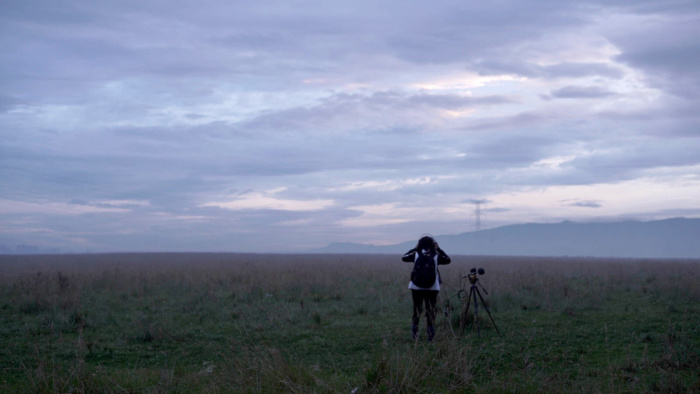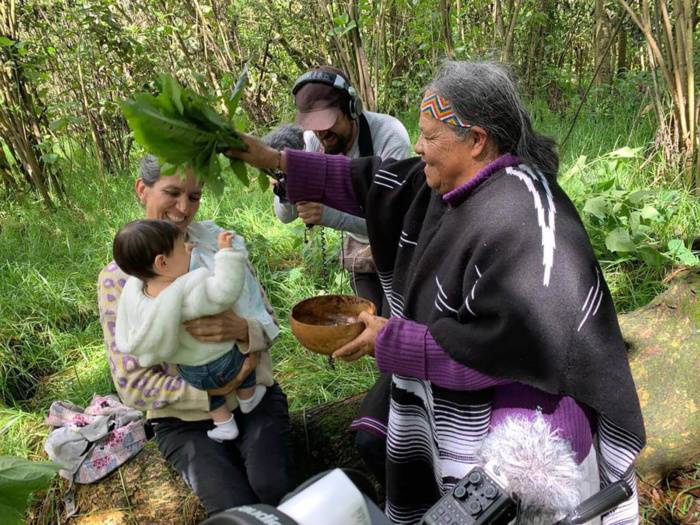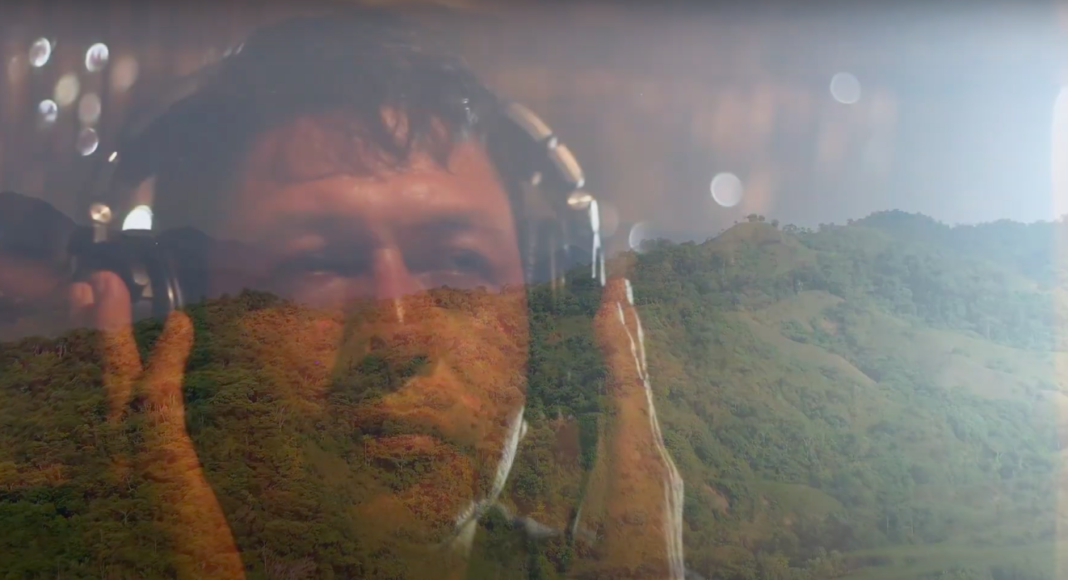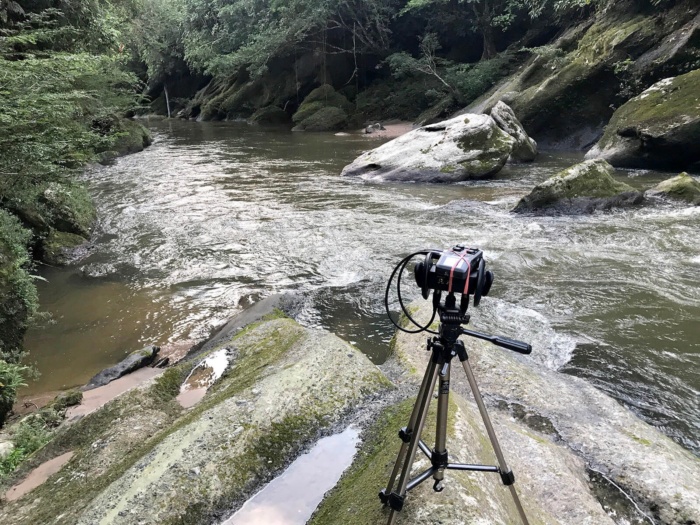VozTerra is the project of a collective of climate change campaigners promoting sound recording as a way to reconnect to nature and galvanise environmental change. Listeners can tune in online to natural sound bites recorded all over Colombia, listen to conversations between inhabitants and their environments and even upload their own message of environmental solidarity. The VozTerra website offers activities for children and youth, guided meditations in nature and explorations of protected areas of Colombia through informative and immersive ‘sound chapters’ – and they’ve recently released three compilation albums. But can their platform bring citizens together and urge them to protect local ecosystems?
Lany Arevalo and Diana Restrepo of the multidisciplinary team that make up the VozTerra collective reflect on how the pandemic has affected our capacity to hear our environments. ‘Music? All of that comes afterwards. What gives birth to that music? Listening’.
Born from a UNLive initiative aimed at utilising culture as a tool for environmental change, the Colombia-based collective formed in 2019, reflecting a renewed continent-wide interest in the capacity for sound to move the public to act on the issue of sustainability.
The progressive team is formed of sound artists, composers, biologists, meditation instructors and multimedia designers, including Hector Buitrago, musician and producer from the emblematic Colombian band Aterciopelados.
Together they’ve established an interactive digital platform housing sound recordings and have initiated a series of music releases blending field recordings with techno beats and sound art. In doing so, they’ve tapped into what they hope will be revealed as a particularly Latin American sense of nostalgia for biodiversity and pleasure in sound.
The compilation albums Ventanas Vol. 1 and 2 were both released this year and mix sounds recorded by citizens from their open windows during lockdown, with compositions from a diverse range of Colombia’s leading musicians. The illustrious rock duo, Aterciopelados, feature alongside Andean band Walka on an upbeat, rhythmic, charango-heavy track. Electronic producer Savan listens to the sounds of the forest, interpreting the buzz of insects as synths and beats on a heavy techno track, and Elkin Robinson, the revered Caribbean musician from Providencia island, contributes “Soul of An Island”, with sounds of the sea, seabirds and rhythmic calypso guitar.
Sound recording in environmental politics
By 2019, the Thomas Van Der Hammen nature reserve and the neighbouring area known as El Conejal, which both sit within a large wetland expanse (los humedales) to the north of Bogotá, was coming under increasing local and national scrutiny due to the threat of urbanisation and agricultural exploitation.
Bogotá is one of Latin America’s most rapidly growing and polluted cities and is under constant pressure to expand. A number of successive mayors have been keen to extend the city’s urban sprawl along one of the main access routes to the north, threatening the natural wetlands fed by the 1,395k-hectare complex of subterranean drainage systems that lie below the Van Der Hammen Reserve.
The plans have been resisted by academic and civic campaigns, mounted by an increasingly unified political and cultural movement. The leading Colombian broadsheet El Tiempo has even called the resulting stand-off a ‘cold war’.

This, plus the political sea change presented by the increasingly young and environmentally-conscious bogotano population, gave VozTerra their cue to act. Creating a database of educational resources and scientific analyses of the reserve’s environmental value, the team have fought against its development through creatively reminding citizens of its value.
‘Los humedales inhabit a special place for bogotanos’ argues Lany Alevaro, who, as a biologist and yoga expert, has played a pivotal role developing VozTerra’s appeal to issues such as human rights and environmental regeneration. ‘From the beginning, we wanted to conceive of this as a struggle for citizenship and VozTerra is testament to this intricate dialogue that occurs between ecosystems and politics’.
Amidst much political wrangling, plans to expand the city have been halted by a pact aimed at preserving increasing tracts of the natural wetlands. Current Mayor Claudia López has vowed to set in motion an ambitious project to convert the area into one of Colombia’s biggest urban forests.
Ecology on the dancefloor
A large part of VozTerra’s success is thanks to securing the participation of the Bogotá techno powerhouse, Kaputt, and their accompanying creative producers and record label. With a daily footfall of 700 revellers (outside of lockdown) in their central Bogotá nightclub, plus tens of thousands of virtual followers, the collaboration with Kaputt has fostered excitement among a young, forward-thinking, urban demographic. ‘We want people who move’, explains Lany buoyantly; ‘this is ecology on the dancefloor!’
Together they’ve released the compilation album Reserva. On this record, leading Colombian DJs explore our human impact on the planet through incorporating natural field recordings into their electronic compositions.
This partnership has played a key role in galvanising VozTerra’s followers. Felipe Rodriguez, one of the DJs from Colombia’s underground music scene who stepped up to the proposal, describes music and dancing as a ‘mystical experience’ and urges electronic music fans to engage with ecology.
Bogotá is home to 10.9 million inhabitants, over half of whom have migrated to Bogotá from rural areas over the past half century. Many of these migrants have a profound sense of what they have lost through urbanisation.
‘The platform amplifies a tremendous diversity of voices’, Lany points out. The collective has grasped how listening can foster profound subjective experiences and how ‘fun’ can serve as a means of generating consciousness of the environment. ‘All the small actions given life through dance music and sound art and through the interactional format of the digital platform have created a one-to-one experience capable of catering to an increasingly self-aware youth movement’.
‘What we are offering this generation, which is open to new ideas and models of democracy’, explains Diana, ‘is the chance to establish some balance within this scenario. To do this, it is imperative that they listen to their surroundings and, more importantly, that they act on environmental issues’.
Political and cultural potential
With their emphasis on action, representation and citizenship, VozTerra are well aware of the political potential of their work. ‘What brought us five relative strangers together’, Diana reminisces, ‘was a profound respect not only for ecosystems, but for the voices of the people who inhabit that system. If we hadn’t broken our knowledge as a society, we would now have a different relationship with nature. This is an effort to regain our patrimony through listening’.
‘This is an effort to regain our patrimony through listening’.

Encouraged by the enthusiasm generated by the platform and the diversity of voices hosted by the database, the team are busy gathering their equipment and making plans for their next excursion out of Bogotá and into the wetlands.
In a city where not only is air pollution attributed as the cause of 10% of deaths, but also where development is exacerbating already tense racial and ethnic relations between urban and rural communities, the cultural validity of Vozterra’s field recordings is important.
Are they concerned that the initiative will have to confront issues of cultural appropriation? ‘The microphone doesn’t lie’, Diana boldly answers.
***
Explore VozTerra’s recordings on their website, YouTube channel, SoundCloud and Spotify.



